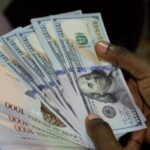The Nigerian naira saw a significant boost on Wednesday, appreciating to ₦1,590 per dollar in the black market, effectively breaking through the ₦1,600 threshold for the first time in weeks. This marks a notable recovery for the currency, which has been under pressure due to fluctuating foreign exchange dynamics.
Compared to its performance at the start of the year, the naira has gained approximately 4.7%, improving by ₦75 from the ₦1,665 rate recorded in early January on the parallel market.
Naira’s Steady Climb in Recent Days
On Tuesday, the naira maintained stability, closing at an average rate of ₦1,600 per dollar, almost unchanged from Monday’s rate of ₦1,599.33. However, the latest appreciation reflects growing confidence in the currency amidst improved market conditions.
Meanwhile, at the official foreign exchange (FX) window, the naira remained steady at ₦1,499 per dollar, according to data from the Nigerian Foreign Exchange Market (NFEM), which is overseen by the Central Bank of Nigeria (CBN).
Factors Driving the Naira’s Appreciation
Currency traders and analysts attribute the naira’s recent gains to a combination of factors, including:
- Improved Dollar Supply: There has been a noticeable increase in foreign currency inflows, easing the pressure on the naira.
- Moderation in Demand: A decline in demand for the dollar, driven by cautious spending habits and policy shifts, has contributed to the naira’s upward trend.
- CBN’s Policy Measures: The Central Bank’s recent efforts to tighten monetary policies have played a key role in stabilizing the exchange rate.
According to Olayemi Cardoso, Governor of the CBN, “The relative stability in the foreign exchange market and the narrowing gap between official and parallel market rates are direct outcomes of bold policy measures implemented since the beginning of the year.”

Outlook for the Naira
The naira’s recent performance signals a positive shift, but market watchers caution that sustaining this momentum will depend on continuous foreign investment inflows, effective monetary policies, and stable global economic conditions.
As Nigeria navigates its economic challenges, the Central Bank’s proactive strategies appear to be yielding results, fostering optimism for a more stable currency in the months ahead.


